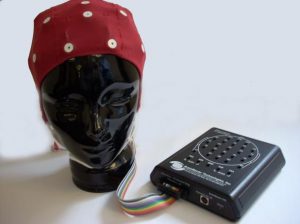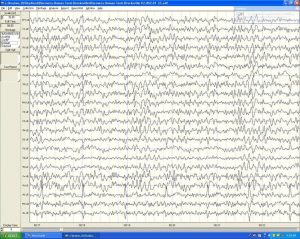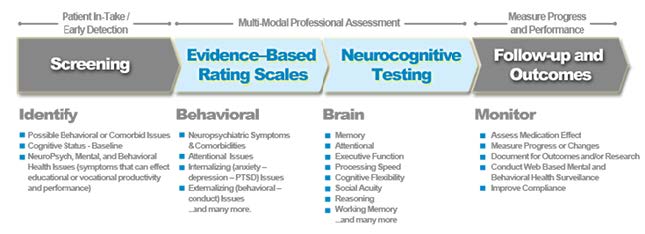06 Aug The First Brain and the Second Brain (Part 1)

The connection between our gut health and our brain health is closely intertwined. You may have experienced this firsthand if you’ve had “butterflies” in your belly when you were in a worried state of mind. The reason for this is that the amazing human body has two brains: the one we are all familiar with that is encased in the skull and a lesser known but vitally important one found in the human gut. The connection between the two brains is so close, when one gets upset, the other does, too.
The most thorough and forward-thinking pediatric gastroenterology doctors will, upon medical exams and scoping that reveal a healthy gut, make a suggestion to consider looking at brain health as a contributor to feelings such as nausea and Irritable Bowel Syndrome (IBS).
Upon such findings, Dr. Dave refers her patients to see if a NeuroCognitive Assessment and subsequent psychophysiological brain training might be an effective intervention when medical exams show no medical reason for the cause of gut ailments such as nausea and IBS. One young patient was seen for Neurofeedback after experiencing a high anxiety-inducing event of seeing a fire break out at an amusement park, which subsequently led to heightened sensitivity to day-to-day events that triggered similar emotions, such as cooking on the stove or seeing a campfire.
This type of reaction is entirely natural as a coping mechanism for a young brain learning to handle stressors, but when the emotional centers of the brain become over-taxed by chronic fear and worry, it can sometimes be hard to turn down that reactivity, and we tend to see it worsen over time without treatment.
By gathering comprehensive information on the patients’ brain fitness and functioning, children and adults can gain improved awareness and control over their mental states which then can allow for improved gut health.
 Brain Fitness
Brain Fitness
Chances are you have seen, read, or heard something about “brain fitness” or “brain-training” recently. The media is clamoring to cover this explosive phenomenon that is fast becoming a cornerstone of health and wellness as well as peak performance.
The reason for this surge of interest in brain fitness is largely due to extensive research showing brain plasticity (the ability of the brain to rewire itself, essentially building new brain cells as well as strengthening connections between neurons within the lobes of the brain) and technological advances that allow the brain to be studied in more detail than ever before.
Brain fitness is the state of having quick, efficient, and flexible cognitive processes. The field is a combination of neuroscience (the study of how the brain works) and neuropsychology (the study of the brain-behavior relationship).
Brain fitness assessments can provide vital information to support an overall health and fitness profile and are now considered to be a key part of comprehensive health and wellness programs.
 Have you ever asked yourself questions such as:
Have you ever asked yourself questions such as:
“Why do I lose focus when I am reading?”
“Why do I forget where I put my keys?”
“How can I reduce my anxiety level?”
“How can I be in control of my emotions?”
If so, brain-training can be a way to learn how to improve and better self-regulate these physiological states. The analogy often used is that brain-training is simply exercise for the brain that works to increase the flexibility, strength, and endurance of our minds.

The first place to start when considering a brain conditioning or training program would be to have a full neurocognitive assessment, just as we have annual physical exams, dental exams and for athletes, likely fitness exams. The technology is now available to provide a baseline of brain fitness from where recommendations can then be made to optimize brain health and performance.
Neuro: of the brain and nervous system
Cognitive: the ability to think, learn, remember, decide, etc.
Doctors know…
- “Neurocognition” refers to the higher brain functions: learning, remembering, concentrating, solving problems, and making decisions.
- Neurocognitive processes are active in virtually all of our day-to-day activities.
- Neurocognitive testing helps your doctor evaluate the health of the higher functions of the brain.
You need to know…
- Good health has many dimensions, but none more important than the health of your brain.
- Neurocognition is increasingly recognized as a major factor in determining a person’s quality of life.
- For the first time, computerized assessment of neurocognition is now widely available and when part of a comprehensive brain fitness package, interpreted by an experienced and licensed healthcare professional, provides invaluable data on current brain functioning.
- This new technology provides you and your doctor with a window into your brain’s function and activity.

Now that we know how important the connection between the two brains is, it’s time to explore how to strengthen the brain. Check back next week to learn how to measure the fitness level of your brain and how to strengthen it with customized brain fitness exercises (you can read it here).
If you would like more information about the brain or gastrointestinal (GI) digestive disorders and nutrition in children,please contact Dr. Mona Dave’s Frisco Office or Request Appointment Here.
Dee O’Neill-Warren is a licensed professional counselor, board certified in Neurofeedback. She sees clients via private practice at 4101 McEwen Drive, Suite 670, Dallas, Texas, or via concierge mobile service. For more information, check out website www.neurofitnow.com, call 972-638-7689, or email dee@neurofitnow.com.